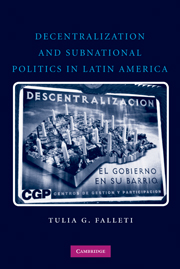Book contents
- Frontmatter
- Contents
- List of Tables
- List of Figures
- Acknowledgments
- List of Abbreviations
- 1 Decentralization and the Revival of Subnational Politics
- 2 A Sequential Theory of Decentralization and the Intergovernmental Balance of Power
- 3 Argentina
- 4 Colombia
- 5 Brazil
- 6 Mexico
- 7 Conclusion
- Bibliography
- Appendix: List of In-Depth Interviews
- Index
2 - A Sequential Theory of Decentralization and the Intergovernmental Balance of Power
Published online by Cambridge University Press: 05 June 2012
- Frontmatter
- Contents
- List of Tables
- List of Figures
- Acknowledgments
- List of Abbreviations
- 1 Decentralization and the Revival of Subnational Politics
- 2 A Sequential Theory of Decentralization and the Intergovernmental Balance of Power
- 3 Argentina
- 4 Colombia
- 5 Brazil
- 6 Mexico
- 7 Conclusion
- Bibliography
- Appendix: List of In-Depth Interviews
- Index
Summary
Decentralization is changing the way we study politics. In the field of comparative politics, a significant number of scholars have recently moved the foci of their analyses from the national to the state-level and local governments (e.g., Chavez 2004; Gibson and Calvo 2000; Grindle 2007; Remmer 2007; Snyder 2001; Wibbels 2005, Chapters 6 and 7), and from the horizontal relations among branches of government to the vertical relations among intergovernmental levels and between centers and peripheral regions (e.g., Amoretti and Bermeo 2004; Boone 2003; Diaz-Cayeros 2006; Eaton 2004; Gibson 2004; Suberu 2001; Treisman 1999).
In the recent past, new or rediscovered types of political representations and aggregation of interests have emerged, which underline the importance of intergovernmental relations, subnational governments, and the associations that coordinate their territorial interests. The study of subnational politics and institutions and intergovernmental relations is no longer “limited to seeing the pirouettes of pettifogging bureaucrats fighting apparently abstract battles over local autonomy, federalism, and revenue sharing” (Tarrow 1978, 1). Instead, we understand intergovernmental and center-periphery relations to be crucial for a wide range of political and economic issues such as the processes of state-building, the negotiation of ethnic conflicts, the stability of governments, and the likelihood of successful adoption of macroeconomic reforms.
Nonetheless, a large portion of the political science and decentralization literature still focuses on the incentives, interests, and actions that derive from the partisan or ideological affiliations of societal and political actors.
- Type
- Chapter
- Information
- Publisher: Cambridge University PressPrint publication year: 2010
- 2
- Cited by



